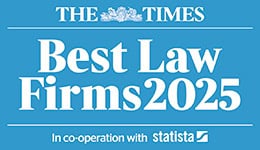The Supreme Court recently gave a judgement in the case of Williams v London Borough of Hackney (2018) UKSC 137 (https://www.supremecourt.uk/cases/docs/uksc-2017-0037-judgment.pdf) which has provided clarification on the scope of local authority powers and duties, under section 20 of the Children Act 1989, to provide accommodation for a child. Maud Davis of TV Edwards acted for one of the interveners, the Association of Lawyers for Children.
Background
The appellants, a mother and father of eight children, brought the case against Hackney after their children were placed in local authority care in July 2007, following the children’s initial removal from the family home by the police (exercising their powers under section 46 of the Children Act 1989). Both parents had been arrested and interviewed by the police, and released on police bail the next day.
Under those bail conditions, the parents were not to have any unsupervised contact with the children. They subsequently signed a safeguarding agreement with Hackney, agreeing that the children should remain in foster care ‘for the present time’. The Court of Appeal, having looked at contemporaneous records, as well as hearing from Mr and Mrs Williams and the social workers involved at the time, said that ‘It was possible that it was not explained that Mr and Mrs Williams could withdraw their consent at any time.’ The Court of Appeal also noted that Mr and Mrs Williams ‘were vulnerable people without advice facing two officials vested with the powers of the state to take their children away, possibly indefinitely’.
The parents then instructed solicitors. Mr Williams’ solicitors wrote to the local authority, confirming his wish to work with them, but also giving formal notice of his intention to withdraw consent to the accommodation of his children under section 20. Mr Williams was prepared to agree to the children remaining in foster care for up to another ten days, to allow for a planned return home; or, failing that, the local authority were asked to provide a timeline.
The children were not returned for a further two months, after the police bail conditions were varied.
The High Court held that the parents had not given their informed consent, and there had been no lawful basis for the accommodation of the children after they were initially removed under police protection. Their claim for damages under the European Convention on Human Rights (ECHR), article 8 (right to respect for privacy and family life) was successful, and they were awarded damages of £10,000 each.
The Court of Appeal allowed Hackney’s appeal and noted that section 20 refers to the word ‘objects’, but the word ‘consent’ is not mentioned. The court noted that the continued existence of the police bail condition meant that Mr and Mrs Williams were ‘prevented … for whatever reason’ from providing suitable accommodation and care for their children (see section 20(1)). As they were not ‘able’ to provide accommodation for their children, their statutory right to object to the children’s continuing accommodation was not triggered (s 20(7)). Put simply, section 20 does not require parents to consent to their child being accommodated, and the Court of Appeal reversed the High Court’s decision.
Judgment
The Supreme Court unanimously dismissed the appeal and held that, as the appellants did not object or unequivocally request the immediate return of their children, there had been a lawful basis for the children’s continued accommodation under section 20. The only substantive judgement was given by Lady Hale.
Importance
With regard to section 20, there are nine key points:
- The starting point is parental responsibility, and a person with parental responsibility may delegate the exercise of his or her parental responsibility. A local authority cannot interfere with a person’s exercise of their parental responsibility, against their will, unless they have first obtained a court order – only the police can do that under section 46 of the Children 1989 Act.
- It may be confusing to talk of parental “consent” to removal (or accommodation). Rather this is a form of delegation of the exercise of parental responsibility, for the time being, to the local authority. The delegation must be real and voluntary, or the local authority would have no lawful basis for taking the child away. The impression should not be given that the parent has no choice in the matter. It is best the parent is fully informed of her rights under section 20, but a delegation can be “real and voluntary” without being fully “informed”.
- Removing a child from the care of a parent is very different from acting when a parent is not looking after the child. In such a case, section 20 gives the local authority the power, and the duty, to accommodate the child, and the parent’s active consent or delegation of parental responsibility is not needed. The same applies if there is no-one with parental responsibility, or the child is abandoned or lost. Nevertheless, it is good practice for the local authority to give parents clear information about what has happened, and the parents’ rights, and the local authority’s responsibilities (including, if appropriate, the local authority’s power – and duty – to bring proceedings if they have reasonable grounds to believe that the child is at risk of significant harm if they do not).
- Parents may ask the local authority to accommodate a child, as a child in need, and the local authority may have a duty to do so if the circumstances fall within section 20(1). If they fall within section 20(4), there is power to do so. Again, this is a delegation of the exercise of parental responsibility for the time being. Section 20 does not expressly require “informed” consent, but it is good practice to give parents clear information about their rights and the local authority’s responsibilities.
- Section 20 (7) restricts the local authority’s powers and duties. The local authority cannot accommodate a child if a parent with parental responsibility is willing and able either to accommodate the child herself or to arrange for someone else to do so, and that parent objects to the local authority providing accommodation. If the local authority believes the parent is unable to care for the child, or the accommodation is unsuitable, then it would have to issue care proceedings.
- A parent with parental responsibility may remove the child from the accommodation at any time. There is no need to give notice, written or otherwise. However, anyone has the right to take necessary steps to protect a person, including a child, from being physically harmed by another. So, if a parent drunkenly demanded the child’s return home, the carer could (under section 3(5) of the Children Act 1989) do what is reasonable in all the circumstances to safeguard or promote the child’s welfare. Beyond that, the local authority would have to rely on police protection or apply for an emergency protection order (if there is reasonable cause to believe that the child will otherwise suffer significant harm). Otherwise, a parent whose clear request for the immediate (or timed) return of an accommodated child is refused can enforce her rights, by removing the child.
- If there is a child arrangements order (live with) under section 8 of the Children Act 1989, or some other order that a child lives with a particular person (e.g. under the inherent jurisdiction, or a special guardianship order), then that parent cannot object or remove the child from s20 accommodation if the person with whom the child is to live agrees to the child being accommodated. That is because such orders restrict the parent’s exercise of parental responsibility.
- Section 20 makes special provision for children over 16, and once an accommodated child reaches 16, a parent has no right to object or to remove the child if she is willing to be accommodated by the local authority.
- There is no limit on the duration of section 20 accommodation. However, local authorities have duties towards accommodated children, such as a duty to safeguard and promote their welfare, in consultation with both the children and their parents. The Care Planning, Placement and Case Review (England) Regulations 2010, SI 2010/959, apply, requiring the local authority to assess a child’s “needs for services to achieve or maintain a reasonable standard of health or development” and prepare a care plan for her, to be agreed with the parents if practicable (regulation 4(1), (4)). The care plan has to record arrangements made to meet the child’s needs and the long term plan for her upbringing (“the plan for permanence”) (regulation 5(a) and (b)).
So, section 20 does not give local authorities compulsory powers over parents or their children and must not be used as such. If a parent does enter into an agreement regarding their child’s accommodation, they are delegating the exercise of parental responsibility for that time only. The delegation must be ‘real’ and ‘voluntary’ (although delegation may be real and voluntary even if the parents are not fully informed).
The best way to ensure there is real and voluntary delegation of parental responsibility is for local authorities and parents to enter into a safeguarding agreement. Although a safeguarding agreement is a matter of good practice only, it is important that it does not give the impression that the parents have no right to object or to remove their children.
Although there is no statutory time limit on the length of time a child may be accommodated under section 20, accommodating children for long periods, without initiating care proceedings could breach the law. Depending on the circumstances, it could be seen as unreasonable in terms of judicial review, or a breach of the child’s or parents’ rights under article 8 of the ECHR.
When section 20 accommodation works well, it promotes children’s safety and well being, with the chance for parents and social workers to work together in children’s best interests. If it works badly, there is a risk of drift and uncertainty for children, misunderstanding, and the breakdown of parents’ relationships with social workers. This judgment, providing lawyers and social workers with clarity in this crucial aspect of local authority powers and duties, is therefore very welcome.
By Maud Davis and Ralph Marnham
 You & Your Family
You & Your Family You & Your Property
You & Your Property You & Your Business
You & Your Business













